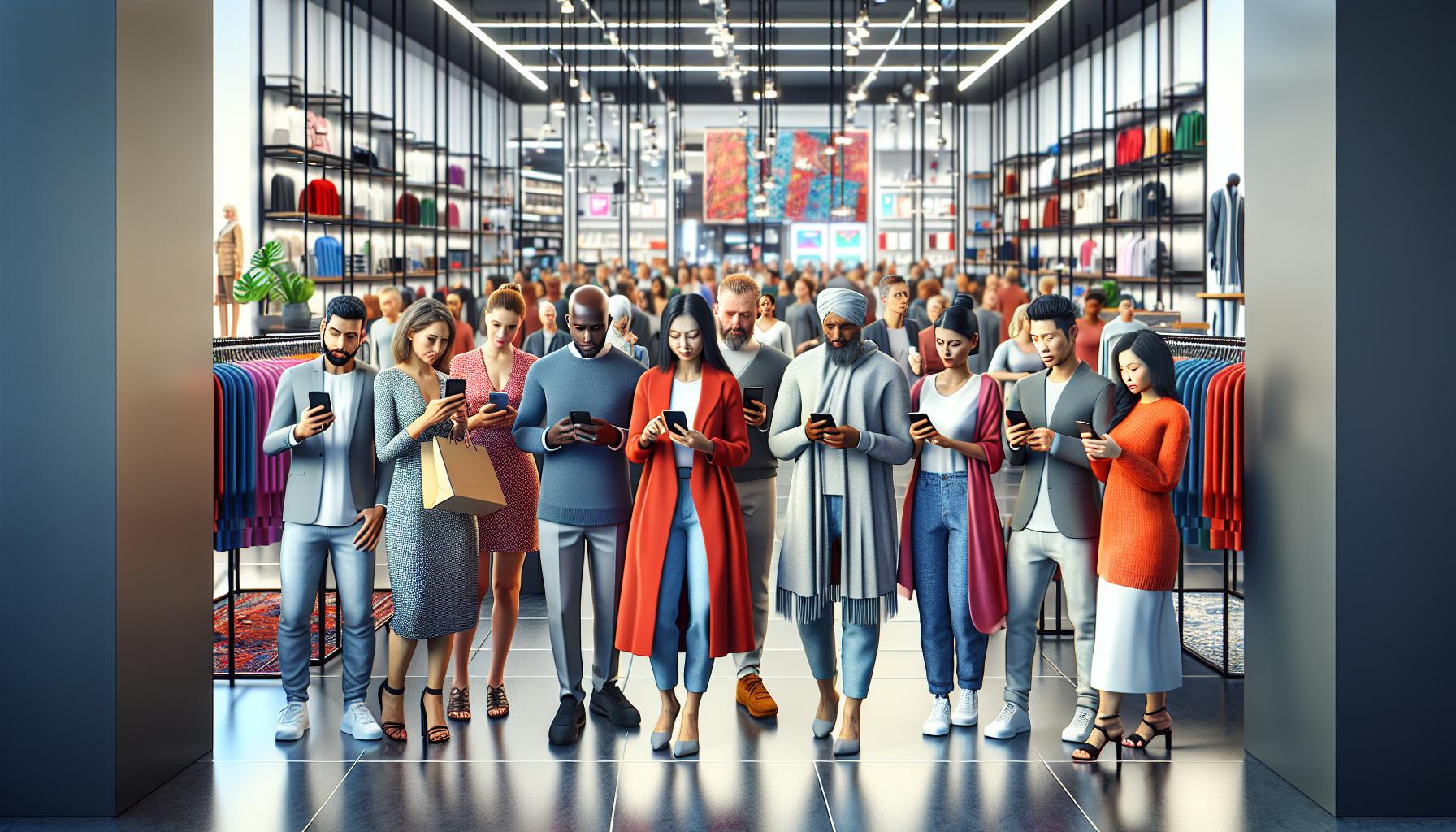In today’s fast-paced world, retail mobile apps have become the secret sauce for shopping success. Gone are the days when consumers trudged through crowded stores, battling for the last parking spot. Now, with a few taps on their phones, shoppers can browse, compare, and snag deals without breaking a sweat—or a nail.
These apps aren’t just about convenience; they’re about turning the mundane into the magical. Imagine finding that perfect outfit while sipping coffee in your pajamas or scoring a flash sale during a boring meeting. Retail mobile apps are revolutionizing the way people shop, blending technology with a sprinkle of fun. So, whether you’re a shopaholic or just looking for the best deals, it’s time to embrace the app revolution and discover how retail is transforming right at your fingertips.
Retail Mobile Apps
Retail mobile apps have transformed the shopping landscape by offering consumers easy access to their favorite products and services anytime, anywhere. Functionality plays a crucial role in these apps, with features like product search, wish lists, and personalized recommendations enhancing user experience.
User engagement increases as retail apps often include loyalty programs, allowing shoppers to earn rewards and discounts on purchases. Integration with social media also facilitates sharing of deals and purchases, tapping into users’ networks for broader reach.
Retail mobile apps streamline payment processes by incorporating secure options, which contribute to faster checkouts and improved customer satisfaction. Real-time notifications alert users to sales or restocked items, ensuring they never miss out on offers.
Analytics in these apps allow retailers to gather shopping data. Understanding consumer behavior helps retailers tailor marketing strategies and improve inventory management. In addition, push notifications engage customers with personalized content, driving repeat visits.
Visual appeal cannot be overlooked; intuitive designs captivate users, making navigation seamless. Optimized graphics and engaging layouts enhance the shopping experience, leading to increased conversions.
Platforms like iOS and Android offer retailers opportunities to reach diverse audiences. The availability of apps across multiple devices encourages consumers to shop with ease. Consequently, the development of retail mobile apps continues to evolve, integrating advanced technologies such as augmented reality and artificial intelligence to elevate the shopping experience further.
Benefits of Retail Mobile Apps

Retail mobile apps offer numerous benefits that enhance shopping experiences and foster customer loyalty. Their functionalities cater to consumer preferences, making them vital for modern retail strategies.
Enhanced Customer Engagement
Enhanced customer engagement is a primary advantage of retail mobile apps. They provide personalized shopping experiences through tailored recommendations based on user behavior. Loyalty programs integrated into these applications reward repeat shoppers with exclusive discounts. Social media sharing options amplify user engagement, allowing customers to share deals effortlessly with friends. Push notifications keep consumers informed about flash sales and new arrivals, prompting immediate action. Additionally, real-time communication channels facilitate customer support, ensuring prompt assistance. All these features contribute to building stronger relationships between brands and their customers.
Improved Shopping Experience
Improved shopping experience defines the impact of retail mobile apps. User-friendly interfaces streamline navigation, allowing customers to find products quickly. Search functionalities enable users to filter items by categories, prices, or ratings, enhancing decision-making. Secure mobile payment options expedite checkouts, reducing cart abandonment rates. Real-time inventory tracking alerts shoppers about product availability, ensuring they shop with confidence. Augmented reality applications further enrich the experience by enabling virtual try-ons and visualizing products in users’ environments. In summary, retail mobile apps enhance convenience while making shopping enjoyable and efficient.
Popular Features of Retail Mobile Apps

Retail mobile apps offer various features that significantly enhance the shopping experience for consumers.
Personalized Recommendations
Personalized recommendations utilize user data to suggest products tailored to individual preferences. These algorithms analyze browsing history and purchase patterns to enhance product discovery. Users often find relevant items that match their tastes, increasing engagement and potential sales. Shoppers appreciate receiving suggestions based on previous interactions, fostering a sense of connection with the brand. Moreover, these tailored experiences drive conversions, as consumers are more likely to buy what resonates with them.
Loyalty Programs and Rewards
Loyalty programs and rewards systems incentivize frequent purchases by offering discounts or points that shoppers can redeem. Participants enjoy exclusive deals and special offers, enhancing their overall experience. Retailers often see increased customer retention rates due to these programs. Engaging users through tiered rewards encourages them to spend more to achieve higher status within the program. Additionally, tracking rewards through mobile apps simplifies the process, allowing users to see their progress at a glance.
Challenges in Retail Mobile App Development

Retail mobile app development faces various challenges that hinder efficiency and effectiveness. Addressing these obstacles plays a crucial role in enhancing user experience and app functionality.
User Retention Issues
Maintaining user engagement proves challenging for many retail mobile apps. Users often download apps but may not consistently return. To enhance retention, developers require strategies such as push notifications that alert users to new deals, reminders for wish list items, or updates about loyalty programs. Users respond positively when apps offer personalized experiences based on their shopping habits. Frequent updates keep the app fresh and engaging, ensuring it remains relevant in a saturated market.
Technical Limitations
Technical aspects form another significant hurdle in retail mobile app development. Developers must navigate compatibility across various devices and operating systems. Performance issues, such as slow loading times or app crashes, deter users and can lead to negative reviews. Developers should prioritize optimizing app performance to enhance user satisfaction. Robust testing is essential before launching updates or new features. Security measures must also prioritize user data protection to build trust and encourage app usage.
Future Trends in Retail Mobile Apps
Retail mobile apps are rapidly evolving, reflecting trends that enhance user experiences and shopping efficiencies. The following subsections highlight two significant trends shaping the future of these applications.
Integration of Augmented Reality
Augmented reality (AR) is transforming how consumers interact with retail mobile apps. Customers can visualize products in their own space before making a purchase. Companies like IKEA and Sephora utilize AR features to let users see how furniture fits in a room or how makeup looks on their skin. This immersive experience increases engagement and helps users make confident decisions. Enhanced interaction through AR leads to higher conversion rates, as customers feel more assured about their choices. Retailers will continue adopting AR to create a more interactive and enjoyable shopping journey.
Advancements in Artificial Intelligence
Artificial intelligence (AI) enhances personalization within retail mobile apps, catering to customer preferences effectively. Smart algorithms analyze shopping behaviors to provide tailored product recommendations and targeted promotions. Retailers such as Amazon leverage AI to suggest items based on previous purchases, leading to improved sales figures. Chatbots powered by AI assist users with inquiries in real-time, maintaining constant engagement. The predictive capabilities of AI also enable retailers to optimize inventory and forecast trends, further refining their marketing strategies. As AI technologies advance, retail mobile apps will become even more intuitive, enhancing overall user satisfaction.
Blending Convenience With an Engaging Experience
Retail mobile apps are reshaping the shopping landscape by blending convenience with an engaging experience. As technology continues to evolve, these apps are becoming more intuitive and personalized, enhancing customer satisfaction and loyalty. Retailers who embrace these innovations are likely to see improved engagement and higher conversion rates.
The integration of advanced technologies like augmented reality and artificial intelligence promises to further revolutionize how consumers interact with brands. As shoppers increasingly rely on mobile apps for their retail needs, businesses must prioritize app development and user retention strategies to stay competitive in this dynamic market. The future of retail is mobile, and embracing this shift is essential for success.



